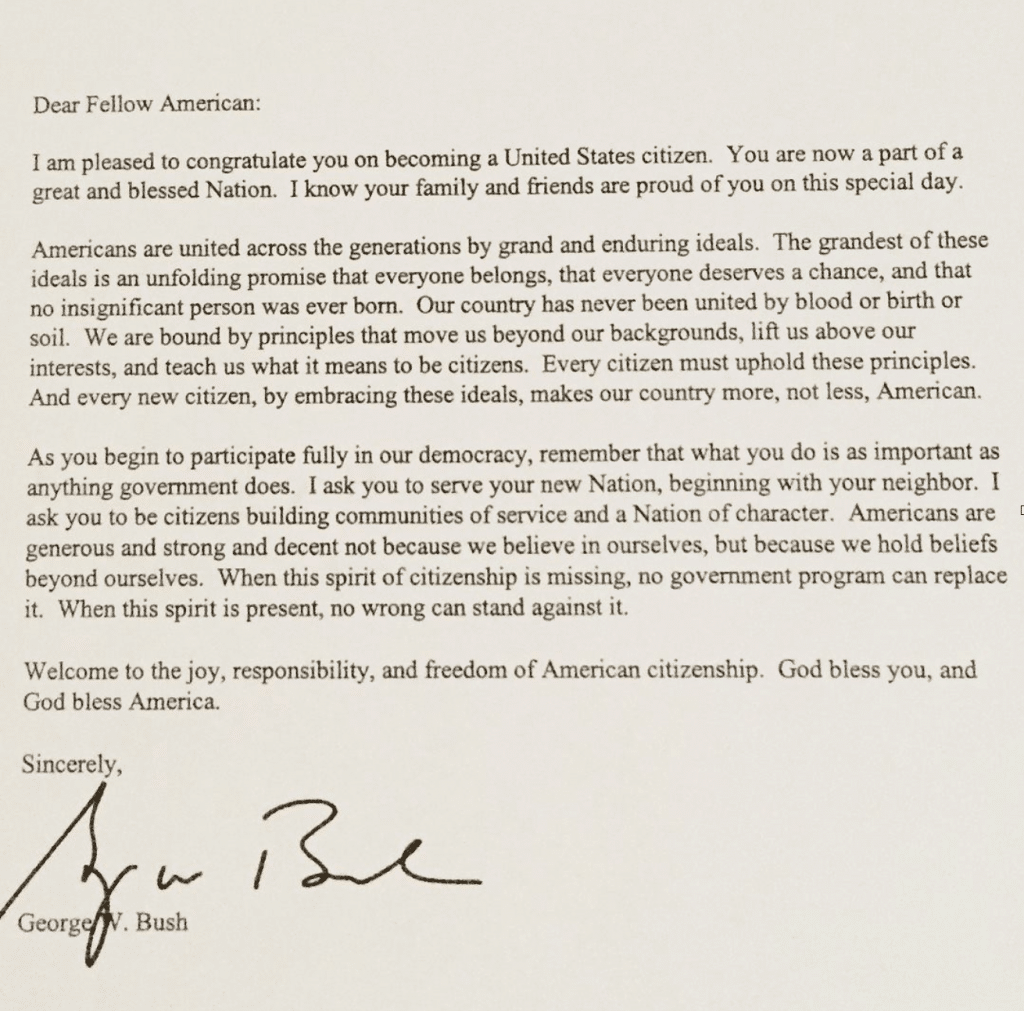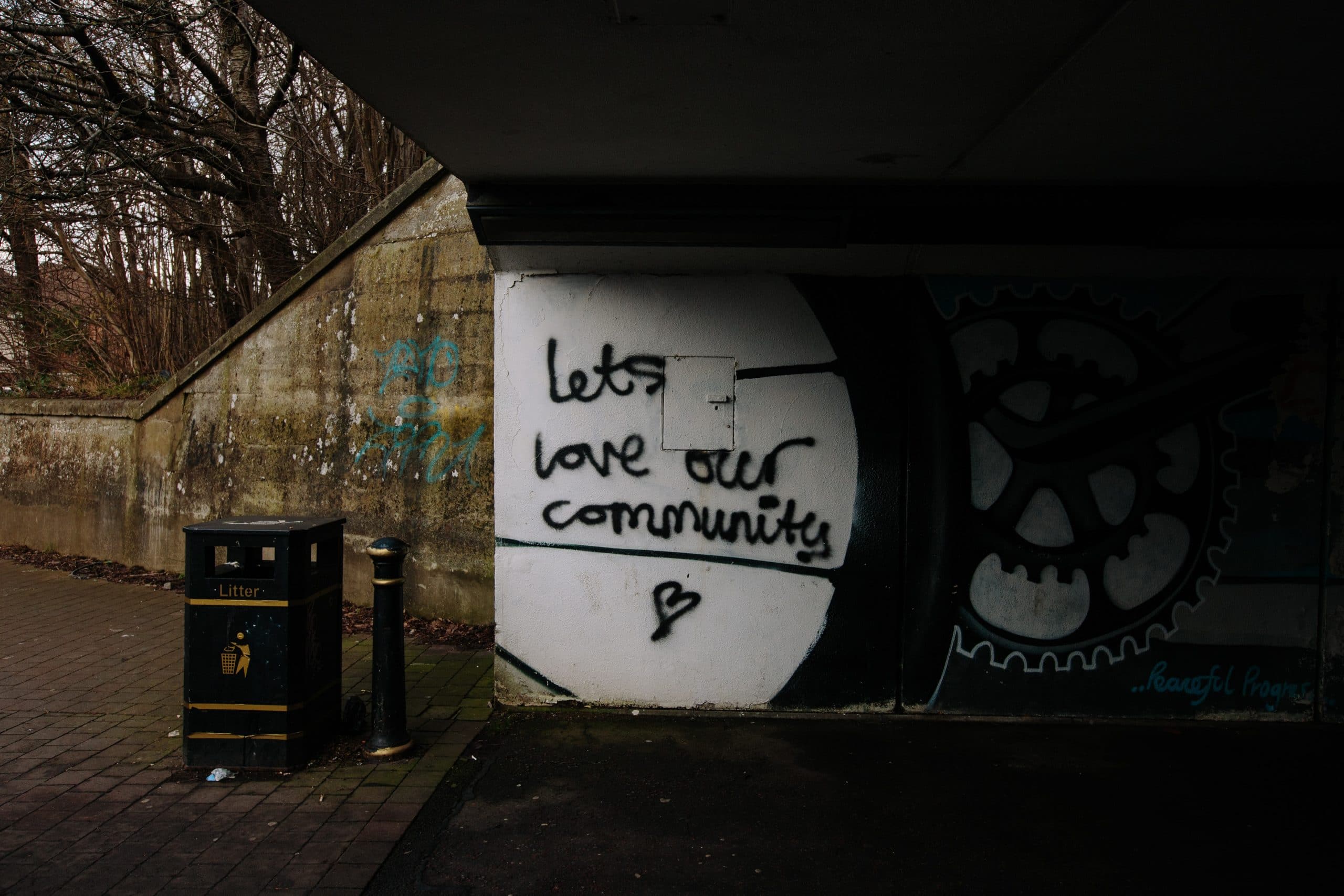(Read Part I here and Part II here.)
In the summer of 2008, I became an American citizen. I went to a ceremony in Miami where a few thousand others made a unison pledge of allegiance and received our marching orders: vote, participate, contribute, take care of our country.
George W. Bush was President that summer, so the letter in my kit was from his administration. I’ve included a picture below. The stated honor of being American, in this letter, was something that always resonated with me: you can belong here. Anyone can belong here. It doesn’t matter who you are or where you came from. We are united by a set of ideas and ideals. If you buy in, you belong.

Some years ago, David Brooks caught my attention with his New York Times columns because he had adopted an interesting approach to social problems. It reminded me of the secular humanist morality of my youth, which upon more careful scrutiny isn’t very secular at all. You can read a couple of samples here and here. I took an interest in his preaching on social contract. He mourned the loss of a tacit understanding he claims (and I hope his recollection is correct) used to be widespread in American culture, that of loving thy neighbor and operating under a set of universally accepted values like courtesy, generosity, and responsibility for self and others. Michelle and Barack Obama also discussed social contract in the first episode (July 29, 2020) of her podcast launched this year. It seems some among us remember a time where being patriotic meant being your brother’s keeper.
Somewhere along the way, this worldview got buried. Maybe too many of us got rich and moved into gated communities where we didn’t have to interact with anyone we didn’t select. Or maybe social and economic developments made education and work so competitive that we could no longer collaborate out of reasonable scarcity fears. Maybe we got sucked into our media echo chambers of choice. Maybe larger political forces leveraged our suspicious lesser natures for their gain. Maybe all of these contributed, and more.
“Values” has also become a bit of a tricky word. Many people associate it with conservative politics centered on the 1950s suburban nuclear family and all the emotional baggage it carries across different demographics. In truth, values are just concepts that undergird our behavior. Our personal values guide the choices we make every day and our reactions to situations in our spheres. Psychology Today covered them here. Psychologist Susan David anchors her framework of emotional agility on knowing and remembering your personal values. Examples of values are cooperation, personal autonomy, honesty, security, innovation, tradition, equity, aesthetic beauty, peace, courage, power, and myriad others. Your personal values are why you vote the way you do, spend money and time the way you do, raise your children the way you do, befriend/date/marry whom you do, etc. When we are unhappy in our lives, Susan David and others of the same mind would ask you if you’re living in accordance with your values; there’s a good chance you aren’t.
So what are American values? Where do we look?
Do we look at our current collective behavior? Do we focus on those who won’t wear a mask to protect people they’ll never meet, or those who are collecting funds to pay hospital bills for their neighbors?
Do we look at our founding documents and monuments? Does it make sense why 8th grade teachers haul apathetic teenagers to Washington, D.C. to visit veteran memorials and the Constitution? Does it now make sense why statues of Confederate heroes inflamed and dismayed many Americans to the point of destruction? What do we think of the Apotheosis of Washington? What do we think of the choice of individuals printed on our money and the way history is taught in textbooks?
Do we look at the economy? Do we laud the billionaire, the small business owner, the first grade teacher, or the essential workers at Walmart? Do we celebrate or shame Trevor Milton? How do we feel about a President that pays less in taxes to the country he serves than the clerk at your nearest gas station?
Do we look at our art? There’s huge variety there. What best represents us, reality dating shows or slave stories?
Do we look at our prison statistics, our schools, our immigration policies? How about our laws regarding the gender pay gap or parental leave? How do we interpret our for-profit medical system? What about our environmental laws, our national parks, our reefs, our carbon emissions, our poisoned rivers? Why does Flint, Michigan, still have that serious water problem?
I’m opening many more cans of worms than I could ever begin to address. These are conversation starters, even if the conversation is only with yourself (and for me, myself).
I think when anyone is asked to define what America means to them, they can go a few different routes. They can discuss America in terms of ideas, structures, or people, as well as geography and history or really simplistic, concrete symbols. I thought Part I of my essay focused on structure, Part II on people, and Part III on ideas. The truest statement is that these three are inseparable from each other. You cannot relate to people and not involve structures or ideas, because they underlie relationships. You can’t have structures without people or they are meaningless, and they are directionless without ideas. Ideas without the others are basically vapor.
What I have outlined in my mind is a nation (that is, a people) rooted in values that inform our structures. The three together produce our day-to-day and the record that will appear in future history books. The values I hope will guide us are easily seen in the letter I received the day I became an American citizen. I hope we can be community-minded, strong, decent, and generous. I hope we can hold beliefs beyond ourselves and let those guide our personal actions and our public policy. I hope everyone is given the opportunity to belong.
I don’t know about you, but that’s where I want to live, and I’ll be proud to be part of it.
Reality Changing Observations:
1. What are some of your core values?
2. How do your values show up in your decision-making and the life you have built?
3. Where is your life misaligned with your values? How might changing course bring you personal peace and satisfaction?






